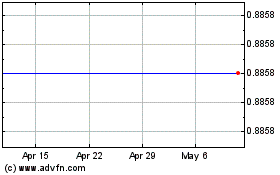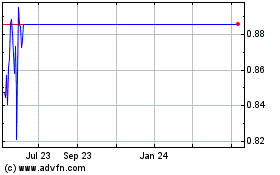By Jenny Strasburg, John Letzing and Max Colchester
Current and former executives at Credit Suisse Group AG,
stretching from New York to the Swiss lender's top ranks in Zurich,
are sparring over who was responsible for the bulk of almost $1
billion in losses in recent months, according to people familiar
with the matter.
One particular point of dispute: Past and present top executives
of the investment bank have given differing accounts of who was in
charge of what during a critical period for the loss-making trading
business late last year.
The ongoing dissension, details of which haven't been previously
reported, adds to a sense of chaos at Credit Suisse, complicating
an-already difficult task for its Chief Executive Tidjane Thiam,
who is scaling back the lender's investment bank to satisfy
investors and regulators. Mr. Thiam must do that while preserving
morale and the reputation of the 160-year-old global bank.
Tensions have escalated ahead of Credit Suisse's annual meeting
this Friday in Zurich, where Mr. Thiam will face shareholders whose
stock has lost 41% since he took over in July.
The issue sprang into public view in March, when Credit Suisse
announced bigger-than-expected losses in its business that trades
bonds, issues debt and packages loans into customized securities.
Mr. Thiam said he and his finance chief hadn't been made fully
aware of looming risks until January.
The episode's roots reach back into the fall of 2015, with Oct.
21 being a pivotal date. That's when Mr. Thiam unveiled a sweeping
reorganization of the bank.
As part of the overhaul, New York-based Timothy O'Hara was
promoted to oversee Credit Suisse's entire global markets unit,
which trades stocks and bonds and sells research to hedge funds,
pension funds and other clients. Gaël de Boissard, until then the
bank's London-based global head of fixed income, stepped down from
that role and from the bank's executive board.
At issue now is the precise chain of command within the markets
business over the next two months, when Mr. O'Hara was reorganizing
his management lineup overseeing fixed income and other businesses
and thousands of employees.
As losses mounted, Credit Suisse executives close to Mr. Thiam
told employees and clients privately that mistakes were made by
"previous management," according to people familiar with the
discussions. They said the remarks, made as recently as in April,
were directed at Mr. de Boissard, who left the bank in
December.
But Mr. de Boissard told The Wall Street Journal through his
lawyer that he "ceased to perform global head of fixed income
duties of any kind with effect from the restructuring announcement"
Oct. 21 and "ceased to have any reporting line to or from him." Mr.
de Boissard said he no longer received relevant risk reports after
that date.
Through his lawyer, Mr. de Boissard said his "only role in the
intervening period" through the week of Dec. 7 was completing the
handoff of U.K. entities to other managers, "as per the request of
Credit Suisse." He attended a going-away party in his honor with
colleagues Dec. 15 in Manhattan and left two days later on a
five-month skiing trip.
As credit markets worsened late in the year, long-held
distressed debt and loans became harder for Credit Suisse to sell,
according to people familiar with the business. The positions
included loans to companies at various stages of restructuring in
the energy, utilities and housing industries, and securities backed
by junk bonds. Amid the turmoil, supervision of the business
involved reconfiguring reporting lines and even technology systems,
which took until January, people inside the bank say.
And so as credit positions were plummeting in value,
communications about the impact on the overall business fell
through the cracks, according to people involved in the internal
conversations. That created an incomplete picture for senior
executives, bank officials including Mr. O'Hara have told
employees, the people said.
Mr. O'Hara told employees on an April 13 conference call that
during that period late last year, he still had not formally
assumed complete oversight of the trading unit.
Mr. O'Hara also said that before January, others hadn't properly
escalated concerns about trading risks in the business, according
to people who participated in the call.
Some among the Credit Suisse old guard fault neither Mr. O'Hara
nor Mr. de Boissard for the turmoil. Instead, they say, Mr. Thiam's
own management and transition plans were so disjointed that such
problems were inevitable.
Mr. Thiam has relied heavily on a trusted inner circle dominated
by current and former management consultants, people close to
Credit Suisse say. Several senior executives were uncertain of key
details of the CEO's strategic plan until just before it was
publicized on Oct. 21, according to the people.
The bank didn't make Mr. Thiam available for comment.
Outsiders like Mr. Thiam -- who is not Swiss and last ran
insurer Prudential PLC -- may be well-suited to manage tough
overhauls because they aren't tethered to entrenched interests
within their institutions. But appeasing thousands of employees
through painful changes is a tricky challenge.
The Swiss lender is one of the worst performers among European
investment banks, struggling to cut employees and costs, trim
businesses and increase capital cushions to satisfy stricter bank
regulations. Under Mr. Thiam, the bank managed to tap investors for
six billion Swiss francs ($6.18 billion) of capital late last
year.
Mr. Thiam has said publicly that the goal in obtaining the
much-needed funds was "to stay alive." Bank executives and
employees in Switzerland regularly talk about a need to endure the
short-term pain of the strategic shift away from investment
banking, for Credit Suisse's longer-term health.
Mr. Thiam is a natural target for employees in out-of-favor
businesses, such as fixed income. He has opted to ditch much of the
bank's distressed-debt business and slash tens of billions of
dollars in risk-weighted assets from the trading unit's balance
sheet.
When Mr. Thiam disclosed the spate of losses in March, he made
what some insiders describe as an unusual call. He opted to
describe the hit as totaling close to $1 billion, without
qualifying that. Behind the scenes, according to people familiar
with internal discussions not previously reported, Mr. Thiam's team
had choices: It could opt to mention the benefits of interest and
offsetting trades known as hedges that had blunted the losses, as
trading-risk managers and executives in New York wanted.
Or it could present solely the gross losses, based on current
market conditions, absent the benefit of hedges and other positive
factors.
The team chose the latter, in effect maximizing the perceived
shortcomings of Credit Suisse's New York-based global markets unit,
the people said.
Mr. Thiam and finance chief David Mathers disclosed the higher,
gross figure to be consistent with the bank's fourth-quarter
presentation of write-downs in the same businesses, according to a
person briefed on the matter. The lower, so-called net loss wasn't
broken out in either presentation.
A month later, the decision remains divisive. Traders and
executives in New York are angry that their new CEO chose not to
mention that including hedges and other advantageous trades, the
positions in question lost closer to $300 million, according to
people familiar with internal calculations that haven't been made
public.
David Herro, chief investment officer at Credit Suisse
shareholder Harris Associates LP, said despite the recent hiccups,
Mr. Thiam is on the right track. "His strategy is correct and he
should be given the time to execute it," he said. Others caution
that difficulties may persist. Andreas Venditti, a Bank Vontobel AG
analyst, noted that UBS Group AG, which had a far smaller
investment bank than Credit Suisse before UBS began slashing it in
2012, is still trying to wind down unwanted assets.
New York midlevel and senior managers at Credit Suisse's
investment bank complained about rarely seeing Mr. Thiam. People
close to the investment bank said that when Mr. Thiam is in New
York, he sometimes hosts meetings in his suite at a nearby luxury
hotel rather than in the office. A Credit Suisse spokesman said
normal practice is to hold business meetings in the bank's
offices.
Mr. O'Hara has been busy overseeing the revamped, smaller
markets business. Mr. de Boissard was in Greenland this week,
skiing. Rifts over the losses, and how they were described in
public, remain at multiple levels inside Credit Suisse. Swiss and
U.S. regulators have asked for details about the trading issues,
risk reporting and related communications, according to people
familiar with the matter.
On the trading floor, ill will runs deep. A rumor in February
that Wells Fargo & Co. might buy a chunk of Credit Suisse's
investment banking business actually boosted morale, said an
employee in the global markets unit. The rumor was subsequently
denied.
With morale low in New York, some senior bankers and other
employees have been weighing a provocative, albeit symbolic step:
using their shares to vote against the bank's board at Credit
Suisse's annual general meeting on Friday, according to people
familiar with the matter.
"I'm aware that I'm not very popular right now," Mr. Thiam said
in March at a Zurich conference. "But it's not my job to be
popular."
Write to Jenny Strasburg at jenny.strasburg@wsj.com, John
Letzing at john.letzing@wsj.com and Max Colchester at
max.colchester@wsj.com
(END) Dow Jones Newswires
April 28, 2016 14:50 ET (18:50 GMT)
Copyright (c) 2016 Dow Jones & Company, Inc.
Credit Suisse (NYSE:CS)
Historical Stock Chart
From Mar 2024 to Apr 2024

Credit Suisse (NYSE:CS)
Historical Stock Chart
From Apr 2023 to Apr 2024
